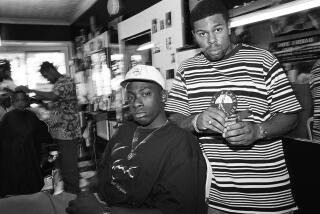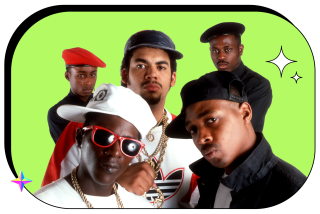Jimmy Cliff Builds a World of Hope
- Share via
Jimmy Cliff still sees himself as an outlaw. Not the sort of gun-toting Robin Hood character he played in the classic 1971 reggae film “The Harder They Come,” but one dedicated to spreading hopeful messages at a time when “ragamuffin” raps on sex and violence are the vogue in reggae.
“I am still an outlaw in a sense, but I have grown spiritually,” says Cliff, who is widely regarded as the greatest living reggae singer. “That character I played, he was rebelling politically. But now I have become more of a spiritual warrior. And the spiritual warrior’s battle is always with self.”
So when Cliff, 51, sings “Rise up and seize the time / You’ve got your world to complete” on his new “Humanitarian” album, he’s not making a call to arms, but pleading for unity and peace. The album’s title track suggests that a spiritual awakening can solve the “many problems in the earth.”
It’s a theme partly inspired by current events back home in Jamaica, where more than 500 people have been murdered this year. Gang wars erupting this summer also have led to curfews and the use of troops to protect urban areas.
“Lots of things are happening in Jamaica now that I’m not really proud of,” says Cliff, who lives in Kingston. “We don’t make guns, but too many guns are firing in Jamaica. This is a kind of a rising up, but not in a positive way.”
Cliff, who performs Sunday at the House of Blues, is one of the creators of modern reggae, along with the likes of the late Bob Marley and Peter Tosh. His new album is a blend of classic reggae rhythm and crisp, contemporary production. It was recorded in Kingston with a variety of local players and producers, from reggae veterans Sly & Robbie to newer talent such as Paul “Computer” Henton.
“I had made quite a few albums outside of Jamaica, and I decided I wanted to touch base again,” Cliff explains. “I wanted to absorb all of the new creativity that was there.”
Among the tracks are Cliff’s versions of Carole King’s “You’ve Got a Friend” and the Beatles’ “Ob-La-Di, Ob-La-Da,” a pop song that the singer describes as “a kind of reggae tune.” There is also “How Long,” an antiwar anthem in the tradition of Cliff’s own 1970 song “Vietnam.”
“I didn’t really write it about any specific war, but it is generally about war,” he says. “Fighting is something that is always going to be in our human nature. We have these two different sides of us. It’s a matter of balancing it. What we are fighting for now is not really something worthwhile. Who benefits from Kosovo? No one really benefits.”
Not all of Cliff’s material is weighted with such monumental issues. Back when he first traveled to England in the early ‘60s to pursue a singing career, his dream was simply to express himself through music, and he enjoyed some early success in Europe as a pop singer.
“All I really wanted to do was to get out this creative yearning that was inside of me,” Cliff says. “What gives me satisfaction is when I am being creative.”
He spent a decade in London before returning to Jamaica to film “The Harder They Come,” a low-budget drama that documented the poverty and struggle of ordinary Jamaicans; it also revealed the roots of the coming reggae explosion. The music was uplifting and soulful, offering messages of hope and self-respect, and has been an enduring influence on artists from Eric Clapton to the Clash to the Sublime.
In more recent years, much popular reggae has evolved into a rapid-fire vocal style, with sometimes indecipherable lyrics that are a dramatic departure from the warm crooning and crisp messages of Marley and Cliff’s generation.
“Reggae music has evolved through different stages,” Cliff says. “This generation, from what I’ve observed, has been swayed a lot by the decadence of the time. So they express a lot about sex and violence, and not showing a way out, a balance.”
For his next album, Cliff expects to inject some Cuban culture into the music. The islands of Jamaica and Cuba are geographically close and share a deep, even profound connection with the local beats and rhythms.
“It’s still an integral part of our life,” Cliff says. “That’s why people like myself and others who take a positive outlook still, you could say, fight against the other artists who are not expressing a positive way. Music is such an integral part of our life, and music has to give us a positive way to see.”
BE THERE
Jimmy Cliff, Sunday at the House of Blues, 8430 Sunset Blvd., West Hollywood, 9 p.m. $30. (323) 848-5100.
More to Read
The biggest entertainment stories
Get our big stories about Hollywood, film, television, music, arts, culture and more right in your inbox as soon as they publish.
You may occasionally receive promotional content from the Los Angeles Times.











